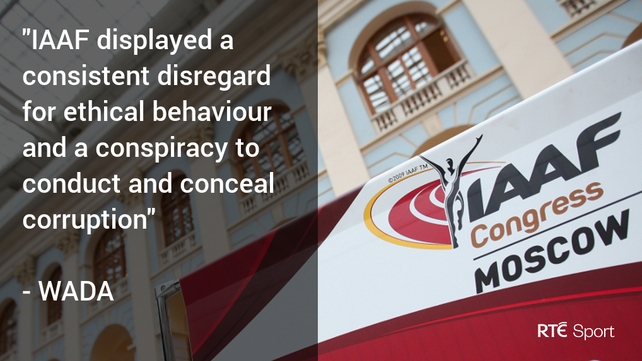The IAAF has been accused of trying to "muddy the waters" in the ongoing doping scandal by one of the experts at the centre of the case.
Michael Ashenden, one of two anti-doping experts enlisted by the Sunday Times to analyse leaked data belonging to the IAAF, has issued a response to the world governing body's statement, released on Friday, in which it insisted it had used "every tool available to it to catch blood dopers in athletics and with considerable success".
Ashenden claimed the 38-page document, released ahead of IAAF chief Sebastian Coe's expected appearance before Parliament's Culture Media and Sport Select Committee next week, failed to answer the key questions.
"The IAAF has released a statement that comprises 25 pages of hair-splitting, plus 13 pages of appendices," his statement said.
"The irony of a disgraced federation casting aspersions is not lost on me. But their deliberately bloated document, no doubt intended to muddy the waters, cannot go unanswered."
The IAAF said on Friday its documents show the world governing body had "consistently been a pioneer" in the war against doping, and sought to demonstrate that it had been rigorous in its testing and use of the blood data it held.
However, Coe's predecessor as IAAF president, Lamine Diack, is under investigation over an alleged payment of more than one million euros to cover up doping offences by Russian athletes.
An Independent Commission, chaired by former World Anti-Doping Agency chief Dick Pound, revealed a systematic programme of doping was implemented in Russia, which has since been suspended by the IAAF.

Ashenden continued: "It is not just the Sunday Times or German broadcaster ARD questioning whether the IAAF 'idly sat by and let this happen'.
"The Independent Commission (IC) has identified corruption and bribery practices at the highest levels of international athletics, currently under investigation by Interpol. A complex conspiracy involving the IAAF.
Evidence of breaches of processes and rules by IAAF officials.
"The IC said that the IAAF was inexplicably lax in following up suspicious blood profiles. I witnessed symptoms of that disgraceful behaviour when I inspected a database drenched with suspect blood profiles. I made comment accordingly.
"However it was not until the IC released its report that I had some insight as to 'why', and 'how', suspect profiles had not been actioned."
In response to the IAAF's claims that it did all it could under the rules, Ashenden said: "Faced with the life threatening blood values which they knew existed amongst their athletes, I say they should have tried to push the legal envelope.
"I have argued previously that there is a place for prudence when launching legal actions based on suspicious blood results. But the blood values were so extreme, over such an extended period, that they should have tried to do something, anything. The IAAF were legally timid when they should have been morally strong."
Meanwhile Kenya, facing criticism it is not doing enough to tackle doping, has banned seven athletes for doping offences.
This raises the total number of Kenyan drug cases in the last three years to 40.
In a statement late on Friday, Athletics Kenya said it had confirmed the sanctions against seven athletes for a range of drug offences.
The list included Emily Chebet, a double world cross country champion and Commonwealth Games bronze medallist. She was handed a four-year ban after testing positive for a diuretic.
Joyce Zakary, a 400 metre runner, and hurdler Koki Manunga were also given four-year bans. Both tested positive for diuretics at this year's world championships in Beijing.
The latest list also included four long-distance runners, Agnes Jepkosgei, Bernard Mwendia, Judy Jesire Kimuge and Lilian Moraa Marita. They were each suspended for between two and four years.

